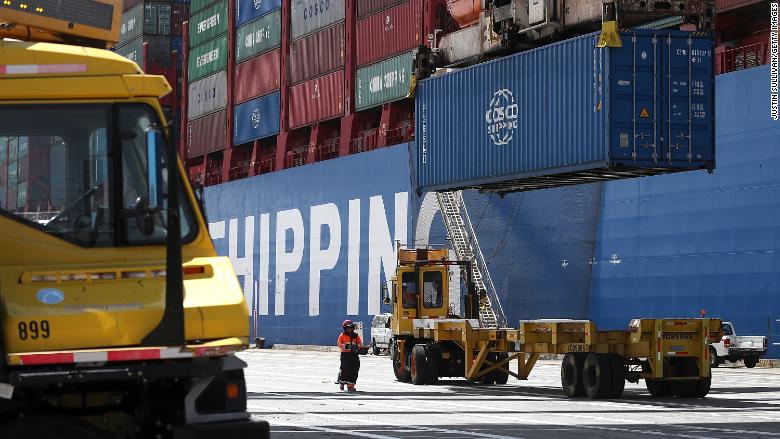China’s exports are slowing. The trade war will make things worse

The Chinese economy’s massive export engine is slowing down as the trade war heats up. A new salvo from the United States could push it into reverse.
Growth in Chinese exports weakened to just under 10% in August, down from more than 12% the previous month, according to government data published over the weekend. The performance is significantly below China’s average for the year so far.
The situation is likely to worsen in the coming months as the trade war between China and the United States escalates. President Donald Trump said Friday he’s prepared to impose another huge wave of tariffs on $267 billion of Chinese products.
On top of tariffs already in place or in the works, such a move would apply new taxes to the entire $505 billion of goods the United States imported from China last year.
As a result, China’s export growth “could tumble to low single digits and even negative territory in coming months,” analysts at investment bank Nomura wrote in a research note. That would pile more pressure on an economy that is already battling serious headwinds, they said.
The weakness in Chinese trade is so far coming mainly from slowing growth in exports to big trading partners like the European Union and Japan.

Exports to the United States actually rose to a record high during August, helped by the fall in the Chinese currency against the US dollar and the rush by companies to ship goods before the next round of tariffs comes in, according to analysts.
China’s huge trade surplus with the United States is at the heart of the dispute. The fact that it’s still growing “is likely to add to the friction” between the world’s top two economies, Louis Kuijs, head of Asia economics at research firm Oxford Economics, said in a note to clients Monday.
Chinese stocks and Aussie dollar decline
Concerns about what might happen next were reflected Monday in declines in Chinese stocks (SHCOMP).
The Australian dollar, which is viewed as a gauge of confidence in China’s economy because of the huge amount of Australian raw materials bought by Chinese companies, also came under pressure. It was trading near its lowest level against the US dollar since early 2016, when fears of a collapse in Chinese growth roiled markets.

Falling exports could pressure Beijing to find new ways to juice economic growth, according to Nomura.
Chinese officials have already turned to tax cuts, infrastructure spending and looser monetary policy as they seek to prop up growth.
The Chinese economy began cooling off this year, and signs of stress are multiplying. Data last week showed Chinese factories are losing export orders and suffering from weakening growth in infrastructure investment.
“The incoming exports slowdown suggests it might take longer for China’s growth to recover,” the Nomura analysts said.
China’s stock market and its currency have been pummeled in recent months by investors concerned about the health of the country’s economy.
But many analysts say they doubt authorities will purposefully devalue the Chinese yuan against the dollar in order to reignite export growth, as this could set off turmoil in financial markets and send a flood of money pouring out of the country.
CNNMoney (Hong Kong) First published September 10, 2018: 5:44 AM ET




